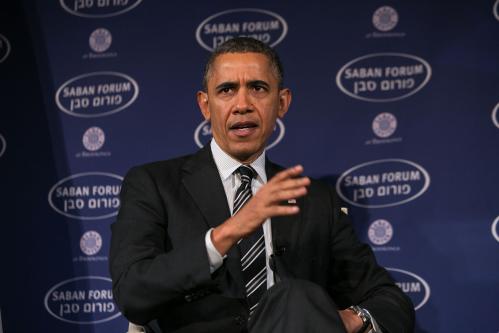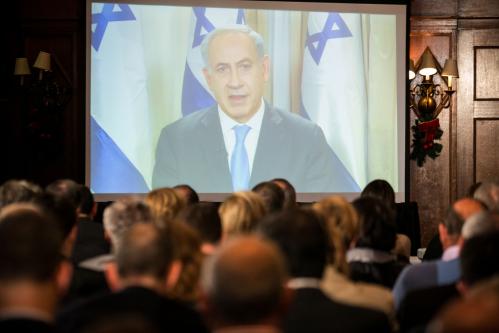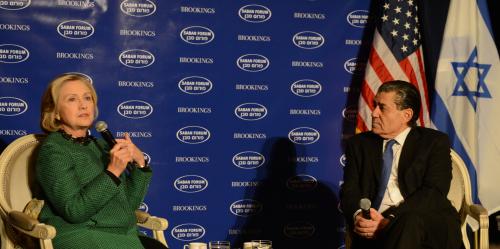Vice President Joe Biden deployed his trademark folksy style in an address to delegates at the 2014 Saban Forum, underscoring the close American-Israeli cooperation on shared priorities and dismissing criticisms of American diplomacy with Iran as “malarkey.”
Watch the entire speech here, and please check the main Saban Forum 2014 site for live and archived material from other webcast sessions, including addresses by Israeli Labor Party leader Isaac Herzog, Prime Minister Benjamin Netanyahu (via satellite), Secretary of State John Kerry, as well as a fascinating discussions between Saban Forum Chairman Haim Saban and former Secretary of State Hillary Clinton, and between Brookings Foreign Policy Vice President Martin Indyk and Israeli Minister of Economy Naftali Bennett.
Biden praised the robust alliance between the United States and Israel, saying that “overwhelmingly in the self-interest of the United States of America to have a secure, democratic friend, a strategic partner like Israel. As I said, it’s no favor; it’s an obligation but it’s also a strategic necessity.” He cited U.S. security assistance to Israel at $17 billion since the administration took office, or $8.5 million per day, and noted the contribution of the Iron Dome missile defense system to the safety of Israelis. Biden repeatedly expressed his affection for Israeli Prime Minister Benjamin Netanyahu, noting that “(w)e drive each other crazy, but he has truly been a personal friend for well over 30 years.”
The Vice President insisted that “(t)here’s absolutely no daylight, none, between us and Israelis on the question of Israel’s security,” but added that “as friends, we have an obligation to speak honestly with one another, to talk about, not avoid the tactical disagreements we have.” He urged participants “let’s not make more of what are normal disagreements that occur between friends than warrants. Israel disagrees with us on a number of tactics. They have a different perspective on how to proceed. But folks, that’s the downside of democracy. It also has an upside. We never have to wonder where the other guy is standing.”
Biden devoted the bulk of his remarks on regional issues to Iran. He insisted that Israeli officials “have been in every jot and tittle of everything we’ve thought about as it relates to engaging Iran from the very beginning” and dismissed criticisms of the American position on Iran as “malarkey.” He added that “(t)here’s been a lot of malarkey around our position on Iran. So let me state it absolutely clearly. We will not let Iran acquire a nuclear weapon, period. Period. End of discussion. It will not happen on our watch.”
Biden estimated the odds of achieving a comprehensive deal on the Iranian nuclear program as “a less than even shot,” but he added “it’s a shot” and reminded the audience that many did not anticipate Iran’s adherence to the terms of the interim accord or the durability of the sanctions regime.
“Our strategy has been underestimated from the beginning. They told you. You remember. Many people said we couldn’t even put together the coalition to keep the most successful sanctions in modern history. Some people, including some of you in this room, good people, Democrats and Republicans, said the Joint Action Plan was a mistake. Look where we find ourselves. It has frozen its program. It has given us a shot for a peaceful solution.”
The Vice President returned several times to this theme that Washington’s achievements on Iran have been undervalued. He highlighted the effectiveness of the campaign of economic pressure against Iran — which he described as “the toughest multilateral sanctions in history” — as having halted the momentum gained by Tehran under each previous U.S. president toward a nuclear weapons capability. And Biden insisted that the sanctions had been sustained, despite some skepticism, and continued to have devastating impact on Iran’s economy and on the revenue stream needed by the Iranian government for importing goods and balancing its budget.
“Since 2011, sanctions have caused Iran to lose over $200 billion in oil revenue, including $35 billion just since signing the Joint Plan of Action,” Biden proclaimed. “Iran’s economy is 20 to 25 percent smaller today than it would have been had it remained on this pre-2011 trajectory. The bottom falling out of world prices has further complicated Iran’s economic outlook.”
Biden argued strenuously against additional sanctions on Iran at this time, asserting that “we have enough leverage to reach a comprehensive agreement.” He said that one of the most important factors for ensuring diplomatic success on Iran is maintaining unity among the P5+1 coalition, and argued that new sanctions would negatively impact the prospects of doing so. He added that
“(t)here may well come the time when increased pressure is needed and welcomed…But now is not the right time to do that. We could end up with the worst of all worlds — breaking up the coalition, no peaceful resolution of Iran’s nuclear programs, and less leverage to achieve one. And with all this happening in the region, this is not the time to risk a breakdown when we still have a chance for a breakthrough. This is the moment to give our negotiations a little bit more time and space to see if they can reach an agreement that benefits everyone.”
The Vice President emphasized that Washington will only accept an agreement “that meaningfully and verifiably blocks Iran from the pathways that it has available to it to create fissile material for a bomb,” noting later in the speech that “the one thing I can guarantee you is what the president told you a year ago, right at this forum, he said, ‘We will not accept a bad deal.’ Our decision to extend a joint action plan to prove that we’ll continue to press the Iranians to get a good deal that satisfies our bottom-line.”
Biden hinted that the administration’s pursuit of a deal with Iran reflects a calculus about Iran’s internal politics, saying “(t)his is not the time, nor do we have the time now, but all of you in this room know there’s a lot of change taking place inside Iran as well. Some good, some bad. But the idea there’s one single monolith in Iran that is able to be sustained, I think that is a foolish view of modern history. It could be worse, but it also could be better.”
In addition to dealing with Iran, Biden stressed that one of the most important challenges facing Israel is the Palestinian issue. He said that he appreciates that “it’s frightening and the chances that would have to be taken are very, very difficult for leaders to step up and take,” but added “(t)he fact is that I think we have no choice but to continue to try…Given the demographic realities that remain, the best and only option to ensure the survival of a democratic state and Jewish homeland in Israel, is such a negotiation.”
Biden acknowledged the obstacles to peace, noting that the administration harbors “no illusions about Hamas.” However, he invoked President Barack Obama’s rhetoric, contending that “the vast majority of Israelis and vast majority of Palestinians believe as the President said in Jerusalem last year, that peace is possible, peace is necessary, and peace is just.”
He spoke of opportunities that can only be advanced through pursuit of a peace agreement with the Palestinians, and particularly highlighted the prospect of some convergence of interests between Israel and several leading Arab states. He cited Egypt, Jordan, Saudi Arabia and the United Arab Emirates as countries that, like Israel
“find themselves on the same side of two very important struggles, the first against violent extremism, including ISIL, or as our Arab friends say DASH, and a regional struggle against Iran and its proxies. Perhaps the first time in history Israel is interested in general convergence with those basic interests as well as the Arabs. That creates a chance — nothing more, just a chance — for closer relations between Israel and the Arab world. In some ways, this is already unfolding in quiet dialogue between security officials from countries whose diplomats wouldn’t greet each other at airports in the recent past, and still won’t.”
At the outset of his remarks, Biden offered condolences to the family of Luke Somers, an American photojournalist held in Yemen by Al Qaeda in the Arabian Peninsula who was murdered last week during a failed rescue mission. Biden praised the Special Forces “who did an incredible job” as well as the Yemeni government for its cooperation with the effort, and he highlighted the risks faced by journalists and diplomats in pursuing a “noble mission” in conflict zones. Biden highlighted the fact that “since the conflict really began involving us almost 10 years ago, the percentage of journalists and Foreign Service officers who have been killed is almost as high on a percentage basis as some of our military missions.” He described the rescue effort as “a tragic reminder of the violence we face in the Middle East and a potent reminder of what Israelis face every day.”









Commentary
In a Speech to the 2014 Saban Forum, Vice President Joe Biden Plays the Mensch and Tries to Dispel “Malarkey”
December 8, 2014